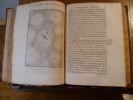DESCARTES
Les principes de la Philosophie Ecrits en Latin Par René Descartes Et traduits en François par un de ses Amis.
A Paris, Chez Henry et Nicolas Le Gras, D. DC. LIX (1659).Un volume in-4 ( 16,5 x 22 cm) de 8pp. d'Epistre, 22 pages de Préface lettre de l'Autheur à celuy qui a traduit le livre, 22 pages de Table, 1 ff. blanc et 477 pp. Reliure plein veau d'époque, dos à nerfs, caissons ornés,pièce de titre rouge. reliure très usée et endommagée, coiffes et coins abîmés, mors fendus en haut et en bas du dos, épidermures. Page de titre tachée, nombreuses rousseurs, "gribouillis" à l'encre sur la page de garde.État passable. Mais bien complet de toutes les gravures et planches in et hors texte dont certaines dépliantes.
Reference : 1560
Bookseller's contact details
Librairie L'Abac
M. Gilles Wolles
176-176A rue Blaes
1000 Bruxelles
Belgium
+3225025322
Payment mode
Sale conditions
Les oeuvres et ouvrages décrits sont complets et en bon état, sauf indication contraire. Nos conditions de vente sont conformes aux usages de la Chambre professionnelle belge de la Librairie Ancienne et Moderne (CLAM) et aux règlements de la Ligue Internationale de la Librairie Ancienne (LILA). Pour les expéditions, nous proposons un tarif écionomique par Mondial Relay pour les pays disponibles (France, Allemagne, Luxembourg, Pays-bas, Autriche, Espagne, Italie, Postugal); pour la Belgique par BPost sauf pour les livres au-dessus de 500,00€ (via DHL). De manière générale, les expéditions sont réalisées par DHL avec suivi aux risuqes de l'acquéreur, part à la charge de celui-ci. Prijzen zijn netto, in euro (€). Alle kunstvoorwerpen en boeken bevinden zich in goede staat, tenzij anders vermeld. Onze verkoopsvoorwaarden zijn in overeenstemming met de bepalingen van de Belgische Beroepskamer van Antiquaren (BBA) en de reglementen van de International League of Antiquarian Booksellers (ILAB). Voor verzending bieden wij een voordelig tarief van Mondial Relay voor beschikbare landen (Frankrijk, Duitsland, Luxemburg, Nederland, Oostenrijk, Spanje, Italië, Postugal); voor België via BPost behalve voor boeken boven € 500,00 (via DHL). Over het algemeen worden verzendingen uitgevoerd door DHL met tracking op risico van de koper, op kosten van de koper. Prices are net, in euro (€). All items or books are complete and in good condition, except opposite indication. Our terms of sale are in accordance with the practices of the Chambre professionnelle belge de la Librairie Ancienne et Moderne (CLAM) and with the rules of the International League of Antiquarian Booksellers (ILAB). For shipping, we offer an economical rate by Mondial Relay for available countries (France, Germany, Luxembourg, Netherlands, Austria, Spain, Italy, Postugal) ; for Belgium by BPost except for books above €500.00 (via DHL). Generally speaking, shipments are made by DHL with tracking at the buyer's risk, at the buyer's expense.
1 book(s) with the same title
Les principes de la philosophie, écrits en latin par René Descartes, et traduits en françois par un de ses amis, revues et corrigez en cette dernière édition -- BEL EXEMPLAIRE
P., Bobin & Nicolas Le Gras, 1668, un volume in 4 relié en plein veau, dos orné de fers dorés (reliure de l'époque), (habile restauration à un coin), (28), 477pp., (1pp.), (1), 1 PLANCHE hors texte représentant les corps en mouvement, nombreuses figures dans le texte
---- BEL EXEMPLAIRE --- Traduction (du latin en français) par l'Abbé PICOT ---- "The principia philosophia contains Descartes'famous vortex theory by which he tried to reconcile Copernican astronomy with biblical teaching. It also contains the first scientific theory of magnetism". "The most comprehensive of all Descartes'works. Dedicated to the Princess Elizabeth, its three treatises embrace the whole of his philosophy, with the exception of the moral. Descartes'design in this treatise was the elaboration of a general theory which would account for the creation and the structur of the world. At the outset he scorfully rejected the whole apparatus of qualitates occultae, employed so freely by the scholastics, and in its place he tried to substitute a rational explanation of the phenomena of nature grounded upon human intelligence and erected upon the mathematical model. In this way he indicated the only solid path ever pursued by physical science, namely, its reduction to the laws of mathematics... On account of its intelligible assuptions, the theory established by Descartes withstook for more than a century all efforts to dislodge it. Fundamentally it assumed all space to be filled with matter, and this, having been endowed in the beginning with motion, has in course of time fallen into a series of vortices in which the sun and the fixed stars, the heavens and the earth, planets and comets are carried. By thus comparing the motion of the celestial bodies with that of terrestrial bodies caught up and floating in whirpools of water, Descartes provided an analogy which at least had the merit of plausibility". (Scott p. 158). "In part I, Descartes sets out the basic principles of his investigation pursuing the methods developed in his Discourse on Method. Part II is devoted to the nature of the physical world and the means by which we may comprehend it. Fundamental to Descartes'physical theories was his conviction that all space was occupied, space was identified with matter, all matter was infinitely extensible and infinnitely divisible ; within the context of this theory a vacuum was impossible as was the existence of atoms. This made for a theory highly compatible with catholic doctrine... Also presented in Part II are Descartes' three laws of motion. Part III not only presents Descartes' conception of structure of the world, but reprensents the first serious attempt at a mechanical explanation of the solar system. The Vortex Theory boldly attempted to reduce the phenomena of the universe to a single mechanical principle...". (Bibliotheca mechanica 1st latin ed. pp. 91/92) ---- DSB IV ---- Des principes de la connaissance humaine - Des principes des choses matérielles - Du monde visible - De la terre**6373/arm3
 Write to the booksellers
Write to the booksellers







